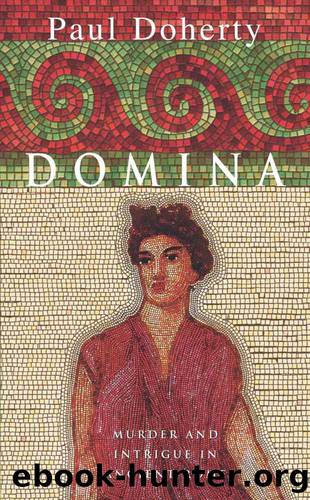Domina by Paul C. Doherty

Author:Paul C. Doherty [Doherty, Paul C.]
Language: eng
Format: epub
Tags: historical, Rome
ISBN: 9780755350490
Google: nIA0AgAAQBAJ
Amazon: B00GU35UOC
Publisher: Headline
Published: 2012-10-30T00:00:00+00:00
Chapter 9
âThe smoke and wealth and noise of Romeâ
Horace, Odes: III, 29
Mevania is a beauty spot a hundred miles north of Rome. Agrippina chose it as the gathering place for her fellow conspirators. A lovely setting to plot mayhem and bloodshed. The villa was cool with well-watered lawns, enclosed gardens, peristyle-shaded walks. It was some distance from the road, and Agrippina had it carefully guarded with all approaches watched. Despite my protests, the conspirators were invited and arrived one by one. Progeones, of course. Lepidus with his long head and shock of black dyed hair: a born conspirator with his twisted smile and bitter, cynical eyes. His weak, furrowed face mirrored unresolved grievances and spite. Then came a brilliant orator, a small, dapper man with flickering eyes and a surprisingly deep voice, dumpy legs and a chest like a barrel. I had heard him speak in the courts: he was brilliant. Agrippina planned to use him to turn the Senate.
Uncle Claudius should have arrived but failed to do so. Instead his representative Seneca made his first appearance in my life. Seneca, a Spaniard, looked every inch the Roman patrician and philosopher. He was of medium height and well built, with a strong, broad face, aquiline nose, and snow-white hair carefully combed forward. Seneca looked like a pompous Platonist except for the shrewd cast to his mouth and those deep-set eyes, which viewed the world with cynical amusement. Seneca had no doubts about the rightness of Agrippinaâs cause. He reminded us all of Arrentiusâs last words, only this time he recast them: âIf life with Tiberius was bad enough, life with Caligula has been pure hell!â
Admittedly I was most uneasy. If you are going to form a conspiracy you must trust everyone involved. I knew little about these plotters. Time and again I broached the matter with Agrippina, but she acted as if she was possessed. She wasnât so concerned about Caligula, more with the child that Caesonia was expecting. One evening, at the end of December, all was ready. The conspirators, or their leaders, gathered in Agrippinaâs bedroom, a place of dark damascene cloths, jewelled cups, gold and silver statuettes, expensive furniture of oak, maple and terebinth, ivory-footed couches, stools and chairs made of tortoiseshell. Her large bed dominated the room. It was carved out of rare wood which reflected in its undulating grain a thousand different shades of colour, like that of the great peacock feathers adorning the wall above it.
Her son was not there. She had left him with trusted nurses in her house on the Via Sacre. We discussed how and when Caligula should die. Agrippina finally made a decision.
âRome would be too dangerous,â she reasoned. âAnd when Caligula reaches Germany, heâll be too well protected. Iâve invited him to visit me. We must do it here!â
âBy poison?â Seneca asked.
Agrippina disagreed. She opened a leather bag and emptied three silver-embossed daggers out on the table.
âIt will be done publicly enough,â she continued. âAnd I will take responsibility.â
Agrippina had assumed the role of the democrat eager to save the republic from a tyrant.
Download
This site does not store any files on its server. We only index and link to content provided by other sites. Please contact the content providers to delete copyright contents if any and email us, we'll remove relevant links or contents immediately.
| Contemporary | Dramas & Plays |
| Historical | Horror |
| Humor & Satire | Literature |
| Poetry | Shakespeare |
Still Me by Jojo Moyes(11265)
On the Yard (New York Review Books Classics) by Braly Malcolm(5525)
A Year in the Merde by Stephen Clarke(5430)
Eleanor Oliphant Is Completely Fine by Gail Honeyman(5282)
The Bookshop by Penelope Fitzgerald(3852)
How Music Works by David Byrne(3270)
Surprise Me by Kinsella Sophie(3112)
Pharaoh by Wilbur Smith(2992)
Why I Write by George Orwell(2952)
A Column of Fire by Ken Follett(2612)
Churchill by Paul Johnson(2584)
The Beach by Alex Garland(2560)
The Songlines by Bruce Chatwin(2555)
Aubrey–Maturin 02 - [1803-04] - Post Captain by Patrick O'Brian(2306)
Heartless by Mary Balogh(2259)
Elizabeth by Philippa Jones(2205)
Hitler by Ian Kershaw(2197)
Life of Elizabeth I by Alison Weir(2086)
Harry Potter and the Cursed Child by J. K. Rowling & John Tiffany & Jack Thorne(2062)
